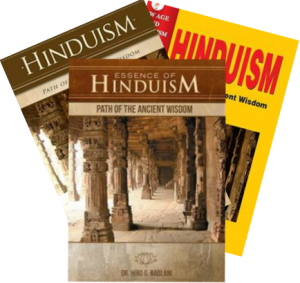The Mahabharata—literally, the story of greater India—is the other twin that has decorated Hinduism, along with the Ramayana, throughout millennia. In the Ramayana, the scene of war is across the ocean, far away from the kingdom of Rama. In the Mahabharata, the scene of war is at Hastinapur, in their kingdom. In both, the war is between the virtue and the vice, right and wrong, good and evil. Indeed, the Mahabharata is the story of the war within our own bosom. The Bhagavad Gita, which is the divine message of this grand epic, is the epitome of Hindu spiritual philosophy.
The Mahabharata is the most fascinating story of this grand legend, narrated by another great Hindu mind, Ved Vyasa, between 400 and 300 BCE. It is the world’s longest epic poem, consisting of one hundred thousand verses. “Vyasa” literally means “arranger.” It may, however, be possible that this is not the name of any one individual; rather, it may denote the position of a compiler. Historians and scholars have established that the Mahabharata was, in fact, written and compiled over many centuries, beginning from the first half of the first millennium BCE and reaching its completion toward the first century CE or even later. In the Ramayana, the story revolves around God, in the form of Lord Rama. In the Mahabharata, it is centered on another God, Lord Krishna.
The story of the Mahabharata begins with an ancient king of Hastinapur, who had two sons. The elder son, Dhritarastra, was blind, so he was barred from sitting on the throne after his father’s death. The younger son, Pandu, ruled for some time but died prematurely when all his five sons, collectively called Pandavas, were still young. In this situation, the old blind uncle Dhritarastra was asked to become the king temporarily until the Pandavas became eligible. In ancient Hindu scriptures, the language used by the great Rishis is often symbolic. Dhritarastra’s blindness, therefore, was not so much physical as it was mental. He could not discriminate between right and wrong. Once he became the ruler, his greed for power again flared up in his mind. He had one hundred sons, all called Kauravas, the eldest being Duryodhana. In the Mahabharata, the five Pandavas represent the virtues, while the hundred Kauravas represent the vices. When the
Pandavas grew up, Duryodhana played a foul trick in order to usurp the kingdom. Yudhistra, the eldest of the Pandavas, was a man of unimpeachable truth, but he had a weakness for the game of dice. His absolute commitment to the virtues of truth and righteousness earned him the legendary status of Dharamraj, the prince of religion. Duryodhana, with the help of his cunning maternal uncle Shakuni, defeated Yudhistra by deception. Dhritarastra, the blind father, remained silent and gave his son tacit support for his immoral acts by not intervening; rather, he hoped that his son would become the king. How often a similar drama unfolds in our own lives when we see our own kith and kin do wrong, but we turn a blind Dhritarastra eye!
When Yudhistra lost everything and his right to the kingdom was gone, he became desperate. He gambled his own five brothers, and later, to his ultimate shame, also lost the common wife of all the Pandavas, Draupadi. After this, Duryodhana became even more wicked. He ordered that Draupadi be undressed before the full court. Yudhistra and his four brothers watched the horrible scene without speaking, but they hung their heads in shame. Draupadi represents our honor; when she was put in this most difficult situation, she looked around and begged for help from all. When no one came forward, she cried for Lord Krishna, who at once saved her honor by providing unending yards of cloth to keep her covered and intact. Much later, Draupadi would confront Lord Krishna, asking why he had not helped sooner. The Lord replied that as long as she was looking for help in other places, he would not come, but whenever she remembered him in full faith, he would always be there. This is Lord’s promise; our God is the spiritual power within us. When man is banking only on his own physical and material aspects, the Divine energy is subdued. Man, however, may tap into the infinite energy of the Divine whenever he wants, if he only he will turn from the material to the spiritual.
After the Pandavas lost the game, they were ordered to go to the forest to spend the next twelve years in exile. When they returned, they requested that they be given a small piece of the kingdom where they could live peacefully. The haughty and unjust Duryodhana turned down this request. Lord Krishna, who was their distant cousin, intervened but to no effect. The Pandavas, with the consent of Lord Krishna, declared war with the Kauravas. Once again, as in the case of Ramayana, it became clear that although war is not a good choice, it could not always be avoided. Both Pandavas and Kauravas approached Sri Krishna for help. The Lord declared that he himself would be available on one side, without any army or armament; on the other side would be all his men and materials, but without him. This is a clear signal for man to choose between God and Mammon. Arjuna, the most proficient warrior prince among the Pandvas, at once opted for the Lord, and, in equal haste, Duryodhana chose the army and other materials. The Pandavas won the war with the guidance and blessings of Lord Krishna.
The Mahabharata is a war within oneself—a war that we all have to fight, within our own conscience, between the right and the wrong. Arjuna, under the guidance of Lord Krishna, kept his attention totally fixed on God throughout the period of war. This helped the Pandavas to not only win the war but this spiritual instruction became a saga of sacred scripture, the Bhagavad Gita, which would transform the lives of innumerable people, across the millennia and all over the globe.
The main purpose of religion is to guide people on the just and virtuous path. The saga of Mahabharata deals with the crucial challenge of the war within one’s own self. The different characters of this great epic depict internal mental attitudes and mindsets, which chiefly dictate how humans behave and act in different situations.
Hindu philosophy states that human beings go through repeated birth cycles, with the next birth being assigned to a person on the basis of his/her past actions-karmas. Only as a human being, one is bestowed with mind to discern the right from the wrong, as also free will, to strive to change the natural born tendencies toward virtue and purity.
Dhritarastra is born with the vasna of greed, which he succumbs to and gives a tactic support to his son Duryodhana, who is not only greedy, but when unrestrained became haughty and sinful. Dhritarastra’s blindness, therefore, was not so much physical as it was mental. He could not discriminate between right and wrong. Dhritarastra, the blind father, remained silent and gave his son tacit support for his immoral acts by not intervening; rather, he hoped that his son would become the king. How often a similar drama unfolds in our own lives when we see our own kith and kin do wrong, but we turn a blind Dhritarastra eye!
Yudhistra, eldest of the Pandva brothers, is born with utmost truth and honesty, but had the vasna of an evil habit of gambling; he ultimately lost not only all the wealth that he had, but also all his brothers and their commton wife Draupadi, with dire consequences to face. Draupadi represents our honor; when she was put in this most difficult situation, she looked around and begged for help from all. When no one came forward, she cried for Lord Krishna, who at once saved her honor by providing unending yards of cloth to keep her covered and intact. Much later, Draupadi would confront Lord Krishna, asking why he had not helped sooner. The Lord replied that as long as she was looking for help in other places, he would not come, but whenever she remembered him in full faith, he would always be there. This is Lord’s promise; our God is the spiritual power within us. When man is banking only on his own physical and material aspects, the Divine energy is subdued. Man, however, may tap into the infinite energy of the Divine whenever he wants, if he only he will turn from the material to the spiritual.
Pure and virtuous to the core, Draupadi initially looks for support in men and material. Only when she realizes how unreliable these sources are, she turns to the Divine, who immediately comes to her aid.
Arjuna had steadfast faith and devotion toward God, and he never faltered. With his mind utterly focused to God at all times, he was able to win, without any tribulation.
Through eons of birth cycles, one may gradually learn and grow; the saga of Mahabharata gives a clear insight of the inborn tendencies (vasna) in human beings, and how the virtuous become the ultimate winners.




